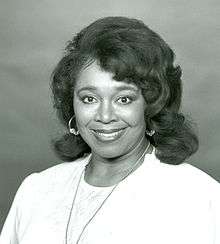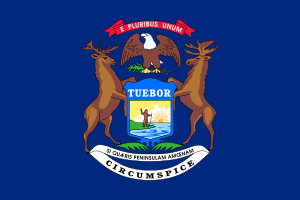Barbara-Rose Collins
Barbara-Rose Collins (born April 13, 1939) is a politician from the U.S. state of Michigan and the first black woman from Michigan to be elected to Congress.
Barbara-Rose Collins | |
|---|---|
 | |
| Member of the U.S. House of Representatives from Michigan | |
| In office January 3, 1991 – January 3, 1997 | |
| Preceded by | George W. Crockett, Jr. |
| Succeeded by | Carolyn Cheeks Kilpatrick |
| Constituency | 13th district (1991–93) 15th district (1993–97) |
| Personal details | |
| Born | April 13, 1939 Detroit, Michigan |
| Political party | Democratic |
| Alma mater | Wayne State University |
Collins was born in Detroit, Michigan, graduated from the public schools there and attended Wayne State University as an Anthropology Major. She was a member of the Detroit Region I public school board, 1971–1973; a member of the Michigan State House of Representatives, from the 21st District, 1975–1981; and a member of the Detroit City Council, 1982–1991.
In 1988, she lost a primary election to the incumbent U.S. Representative for what was then Michigan's 13th congressional district, George W. Crockett, Jr. When he retired, she won the seat,[1] taking 34 percent of the vote in a crowded eight-way Democratic primary. This was tantamount to election in this heavily Democratic, black-majority district. She won handily in November and was reelected three more times, each time garnering over 80 percent of the vote. Her district was renumbered as the 15th district after the 1990 census.
Collins was a sponsor of several bills that passed into law, including the Food Dating Bill, the Sex Education Bill, and the Pregnancy Insurance Bill. She also introduced the Unrenumerated Work Act in 1991, 1993, and 1994. [2] This bill would have required the Bureau of Labor Statistics to set value on unwaged work such as housework, care work, agricultural work, volunteer work, and work in a family business, and include that value in the Gross National Product of the US. This measure had been called for in the Forward Looking Strategies resolution passed at the UN 3rd World Conference on Women Nairobi in 1985. [3] Collins's bill was endorsed by the Congressional Women's Caucus and by 1993 had 90 co-sponsors; however, it failed to pass. [4]
Collins was the subject of a Congressional Ethics Committee inquiry in 1995, under suspicion of 11 instances of misuse of funds. In 1996, after she lost the Democratic Primary for re-election to Carolyn Cheeks Kilpatrick, the inquiry was dropped.[5] After five years out of politics, Collins returned to the Detroit City Council in 2001, was reelected in 2005, and retired in 2009.[6][7]
See also
References
- "Collins, Barbara-Rose 1939– | Encyclopedia.com". www.encyclopedia.com. Retrieved 2019-08-04.
- Collins, Barbara-Rose. "Barbara-Rose Collins". www.congress.gov. Retrieved 2019-08-04.
- "Women Want Credit Where Credit Is Due : 'Time Off' Rally Seeks International Recognition for Paid, Unpaid Work". Los Angeles Times. 1985-10-23. Retrieved 2019-08-04.
- Odum, Maria (1991-04-05). "IDEAS & TRENDS; If the G.N.P. Counted Housework, Would Women Count for More?". The New York Times. ISSN 0362-4331. Retrieved 2019-08-04.
- "AllPolitics - Collins Ethics Case Dropped - Jan. 3, 1997". www.cnn.com. Retrieved 2019-08-04.
- http://www.ourcampaigns.com/CandidateDetail.html?CandidateID=12141
| U.S. House of Representatives | ||
|---|---|---|
| Preceded by George W. Crockett, Jr. |
Member of the U.S. House of Representatives from Michigan's 13th congressional district 1991–1993 |
Succeeded by Bill Ford |
| Preceded by Bill Ford |
Member of the U.S. House of Representatives from Michigan's 15th congressional district 1993–1997 |
Succeeded by Carolyn Cheeks Kilpatrick |

